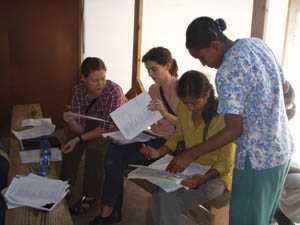Global Water, Sanitation, and Hygiene Epidemiology Team
Team Lead: Eric Mintz, MD
The lead global epidemiology unit for water-related disease in CDC’s National Center for Emerging and Zoonotic Infectious Diseases.
Mission: Providing expertise and interventions aimed at saving lives and reducing illness by improving global access to healthy and safe water, adequate sanitation, and improved hygiene.
Our Global Water, Sanitation, and Hygiene (WASH) Epidemiology Team is focused in six areas:
- Making water safe to drink and use
- Improving hygiene and sanitation
- Responding to complex international emergencies and outbreaks
- Identifying and characterizing disease
- Controlling and eliminating disease
- Educating and training about global water, sanitation, and hygiene
Our team:

CDC staff reviewing patient charts during the cholera epidemic in Haiti
- Implements the CDC-developed Safe Water System, through linkages with antenatal care clinics, schools, the U.S. President’s Emergency Plan for AIDS Relief (PEPFAR) HIV/AIDS programs, community-based programs, social entrepreneurs, NGOs, and faith-based programs
- Conducts laboratory and field research to identify optimal, scalable methods for household water treatment and safe water storage
- Employs behavior change strategies, such as teaching healthy behaviors and promoting their adoption through social marketing and community mobilization
- Studies the burden of diarrheal and other waterborne diseases in different places and populations through the Global Enterics Multi-Center Study (GEMS) and other research
- Examines the health benefits of proper use of water for hygiene, as well as for preparation of foods and beverages
- Investigates outbreaks in collaboration with international partners, such as Ministries of Health, the World Health Organization, and other CDC programs
- Works with CDC’s Global Immunization Division and external partners, including UN Agencies and Ministries of Health, to optimize integration of vaccines against cholera and typhoid fever into outbreak response and prevention of endemic disease
- Studies the associations between water, sanitation, and hygiene (WASH) and waterborne diseases (including soil-transmitted helminths and other neglected tropical diseases [NTDs], diarrhea, and respiratory illness) through the WASH Away NTDs Activity, which aims to better integrate WASH interventions with disease prevention programs
- Develops model programs and materials for public health staff training and community health promotion
Global WASH Epidemiology Highlights
- Page last reviewed: October 23, 2014
- Page last updated: October 23, 2014
- Content source:


 ShareCompartir
ShareCompartir